Growing Closer to My Parents during Quarantine
He sat waiting for me in the lobby of the clinic, wearing a facemask. As soon as I went over, the doctor raised a thermometer to take my temperature. He glanced to check that it was fine before he scribbled something on a piece of paper. He stamped it and said, “Take this over to the village committee and get it stamped”. I took the paper. It was a certificate: Patient’s surname – Deng, male, 69 years old, temperature – 36.5℃. Medical history: diabetes for 10 years, suggested check-up at the local hospital. Accompanied by – Deng Anqing, son, male, 36 years old, temperature – 36.2℃, from such-and-such neighborhood in such-and-such village. Below the text was the doctor’s signature, the date, and the clinic’s stamp.
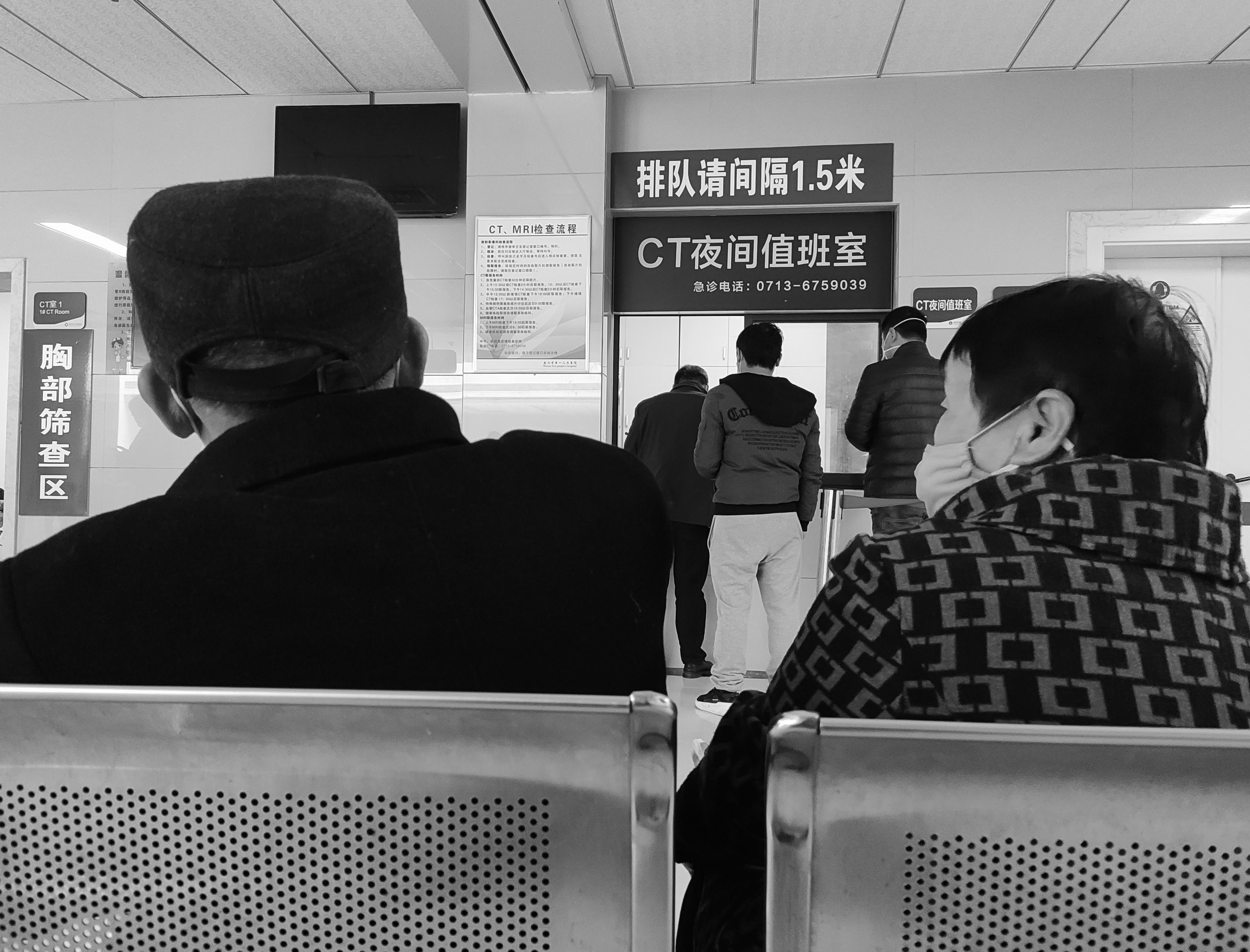
My father and I took the certificate to the village committee building next door, where after we explained the situation, the village head added another sentence at the bottom: Deng Anqing, non-isolating individual. Verified, cleared for passage. Then he stamped it again with the committee seal.
I went home to fetch our electric three-wheeler. After picking up my father from the clinic, we set off along the highway towards the town. After Huanggang was locked down on January 24, my hometown Wuxue (a county-level city under the jurisdiction of Huanggang) closed too. All the public transport ceased. Then on January 31, the use of motor and electric vehicles was also restricted. Without a certificate issued by the village committee, I could not drive the three-wheeler into town. This was my third time helping my father buying medicine because the hospital would only dispense enough to last a week. During the last two visits, they’d given us the run-around, so I hoped things would be easier this time. We needed isophane insulin, which my father has to inject daily. Too long without it would result in high blood sugar levels causing symptoms such as nausea, vomiting, drowsiness, and loss of appetite. Given such risks, our family made sure to keep a watchful eye on him.
The journey along the highway was swift and smooth with no other vehicle in sight. All the riverside entrances into the villages had been sealed off with roadblocks. Officials from each village with badges on their sleeves patrolled the roads. Along the roadside, strung between the trees were long banners with messages that forbade gathering and gambling. When we arrived at the town entrance half an hour later, we found a truck blocking the road, leaving only enough room for one car to pass at a time. Next to it was a tent where several people responsible for checking passing vehicles were seated. I showed them the certificate. They waved us through. This was the first time I’d been to town in the forty-odd days since I returned home from Beijing. Every door lining the road was shut tight. As we turned onto the main road, we encountered yet another checkpoint. Once more I flashed the certificate. They glanced at it and let us through.
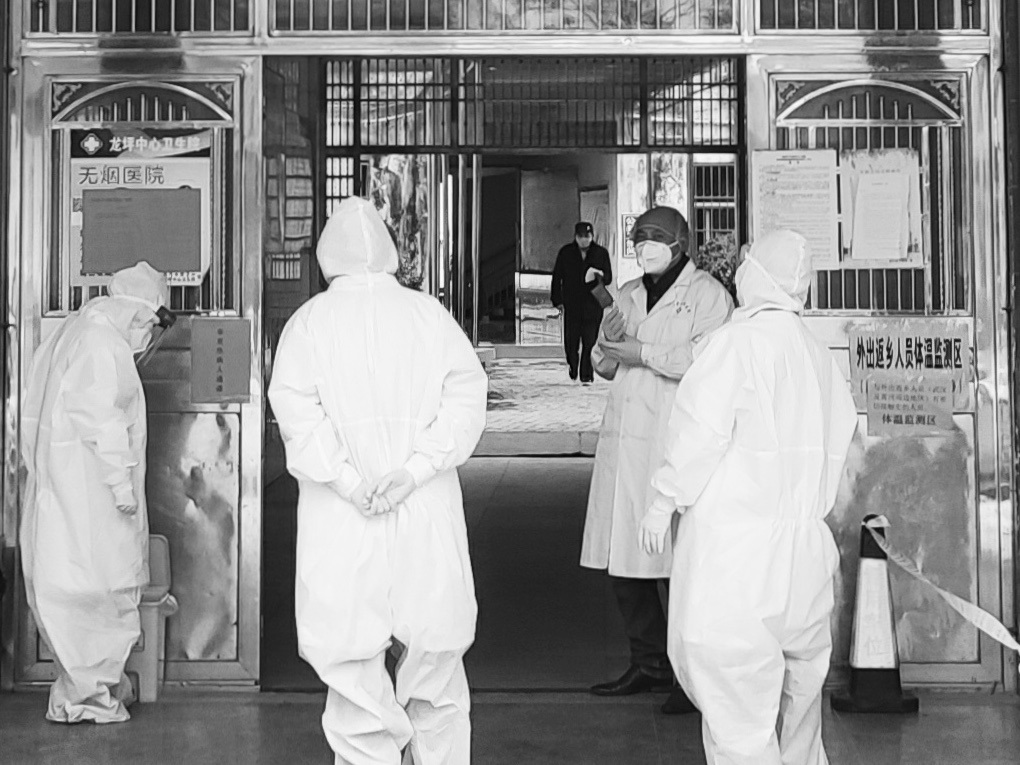
The town hospital was also battle-ready with five people in full-body protective gear standing at the entrance. I went with my father to the reception desk on the left where our temperatures were taken and found normal. My father headed in. I tried to follow but I was stopped. I called after him, “Get a little extra, it’d save us another trip!” My father nodded and went down the corridor with practiced familiarity.
The staff said to me, “You can’t buy however much you want. The amount is fixed.” It was then I understood why the insulin would only last a week at a time. A while later, my father came out with the prescription and asked me to come in to pay. After making sure my temperature was normal, the staff let me in.
While I was paying, my father caught sight of the price and gasped, “How come it’s so expensive? I never pay this much at the pharmacy!”
“Well, this is hospital prices for you,” the cashier said.
My father was about to say something, but I cut him off, “It’s not that much dad, don’t worry about it.”
People were looking at us by now, and I felt embarrassed. I settled up, picked up the medicine, and we headed outside. My father asked me how much I’d paid. I told him it was 158 yuan.
“That’s not so bad,” he said with a nod. “They knocked off 20 kuai or so.”
I started up the three-wheeler. My father, sitting behind, added, “You know, it wasn’t all that expensive really, was it? Especially as the insurance covered some of it.” I nodded in agreement. I knew he was only going on about it because he felt bad for spending my money.
The road home was as deserted as before.
“I’ve never seen anything like this before in my life,” my father said loudly.
“And we don’t know when the lockdown will end,” I replied.
He laughed, “You want to get back to work in Beijing, don’t you?”
“I can get online at home. Work hasn’t really been affected.”
“That’s good.” After a pause, he added, “You’ve never stayed with us this long before. I’m not sure there’ll be a chance like this again.” “Are you sick of me already?” I joked.
He patted my back, “Not at all. I couldn’t be happier to have you for so long! But aren’t you going to get tired of being here? The countryside isn’t as much fun as the city.”
“I couldn’t be happier either,” I said.
This was not a lie. I thought about how every Chinese New Year, I would only stay for a week or two before rushing back to Beijing. I was like a guest, never even bothering to move the clothes from the suitcase to the dresser, because I’d be leaving soon anyway. In those few days there were always a lot of New Year’s visits to make, friends to see, and classmates to hang out with, so I’d hardly spent much time with my parents. But this year was different. Since leaving Beijing on January 19, I’d been home for more than forty days.
I'd asked myself if I regretted coming back. After all, I'd known about the virus before I left. Like many of my friends, I could easily have canceled my trip and stayed in Beijing. At that time, the epidemic hadn’t broken out on a large scale, and things seemed relatively safe. Even among those who returned, many people seized the chance to escape Hubei the night before it was sealed off. A good friend of mine did just that. Before leaving, he went out of his way to ask me if I wanted to go with him, I turned him down. To abandon my parents, to flee by myself, I couldn’t do it. I was glad I didn’t leave. Otherwise, for errands like buying medicine, my father would have found it difficult without my help.
The certificate was still in my pocket. The checkpoints along the way didn’t ask to see it again. Suddenly I remembered a sentence on it. Patient’s surname – Deng, male, 69 years old. I hadn’t realized my father would turn seventy soon. My heart skipped a beat. It’s not that I didn’t already know my father’s age, just that this time, I could see how my father had aged. As a result of his chronic illness, he had lost weight and his complexion was sallow. His gait was frail and he often fell asleep while watching television. Time spares no one, and my father too was marching towards old age. The time I had left with him was in fact very limited.
To tell the truth, my father used to really annoy me. I think the main reason was we are too alike. It’s like looking at yourself in the mirror and only seeing the parts of your body that you hate. Anyone who saw us together said we were just so alike. I didn’t just look like a younger version of my father, my mother said that our natures were exactly the same too. She would tell me, “Don’t just say whatever comes into your head, like your father.” Take the scene that had played out in the hospital just now, with my father grumbling about the cost of his medicine – it had irritated me in the old familiar way. He made absolutely no effort to hide his feelings, and came across as weak, naïve, and impulsive. When I looked at myself, I could see what I inherited from him. A child’s temperament: good-natured, but self-centred and lacking in empathy.
The way he made such a big fuss about the fact that the medicine wasn’t too expensive after all reminded me of something that happened years ago. My father called when I was in Ejin. He asked what I was doing and I told him I was in Inner Mongolia. I was just about to say I was on holiday when he asked anxiously, “Is your danwei covering your costs?” I took that as a warning, and replied, “Yes, they’ll reimburse me in full when I get back.” He breathed a sigh of relief. “That’s OK then.” Every call after that, he asked, “Have they given you your money back yet?” And I’d tell him, “Yes, sure.” A month later, he suddenly brought it up again, “That money, from when you went to Inner Mongolia …" “They’ve paid it. Paid it all,” I snapped. Finally, he let it drop.
My father was so afraid of not having any money. He wouldn’t waste even a coin. Every penny had to be put to good use. Travel is so important to me, but it was impossible to share the joy I got from my travels with Dad. There was no way he would have understood. I tried so many times to connect with him, but he was always so insistent: “Why would you fritter your money away on travelling? It doesn’t pay the bills.” In the end, I just never spoke to him about my life.
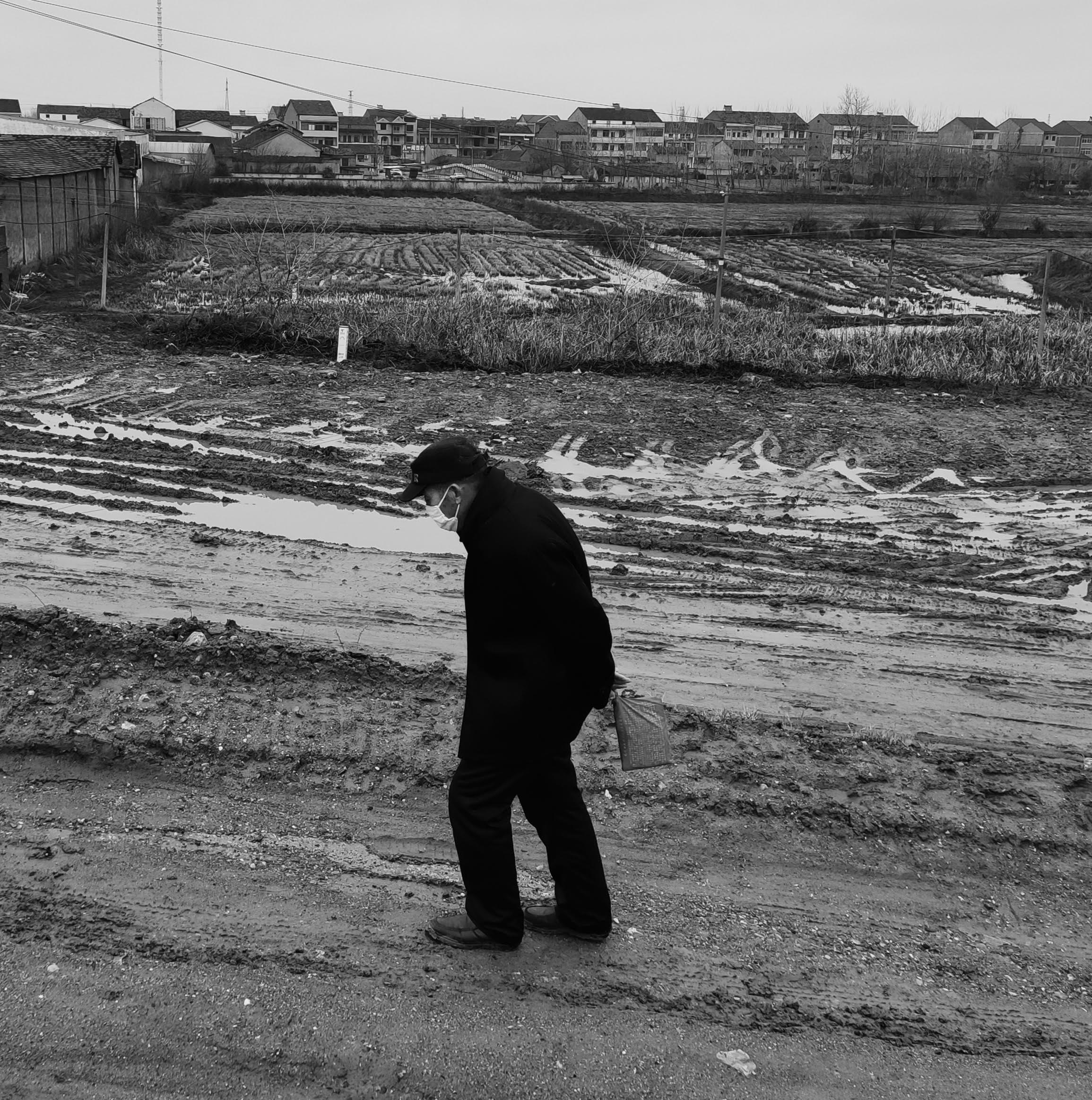
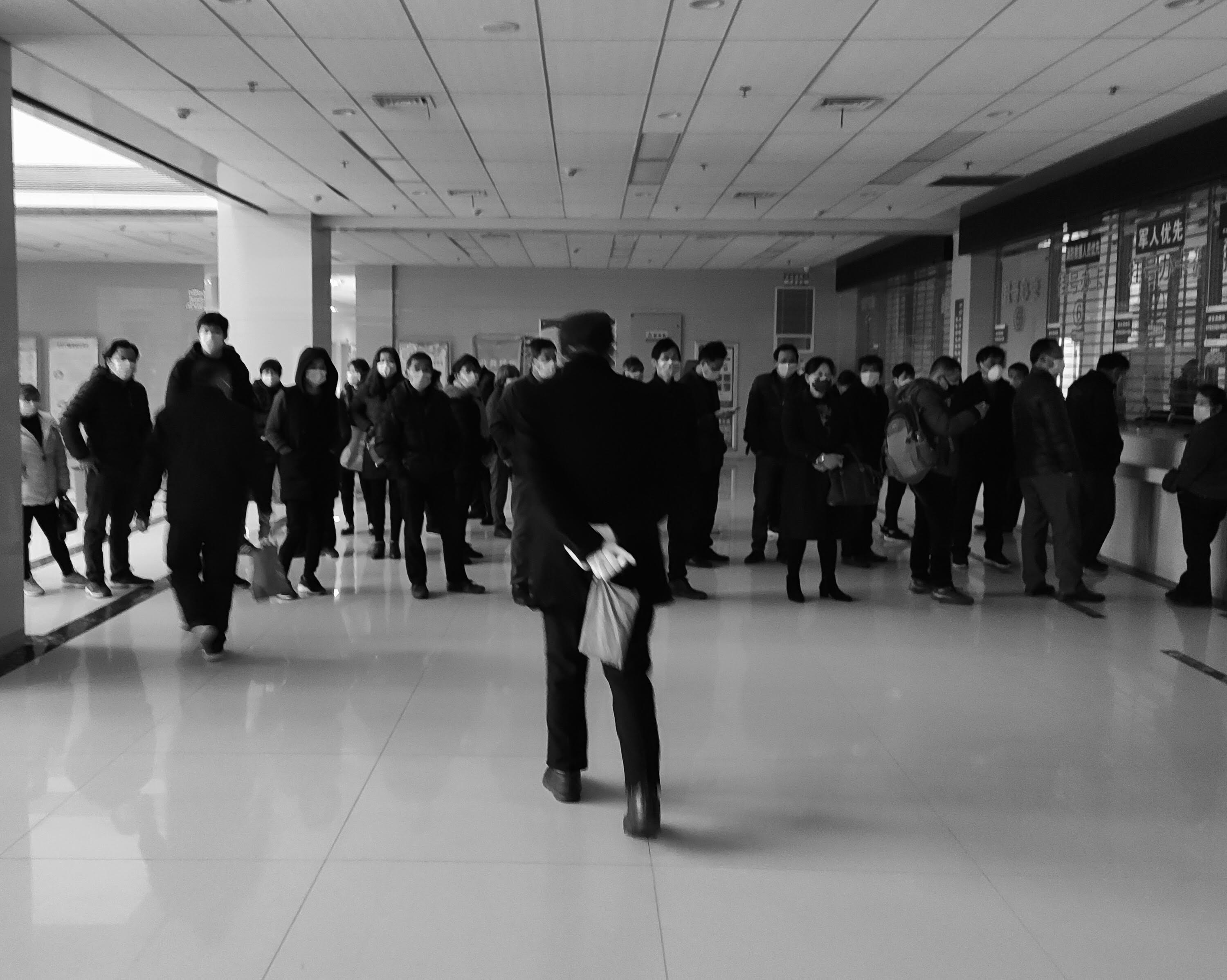
There was a side effect to my father’s worries: I felt strangely guilty even when I was spending my own money. I would think, I could give all the money I spend this trip to my parents to buy food, or I could pay for them to get a check-up at the doctors… In the end, spending money on myself felt selfish. I was only thinking of my own enjoyment. A fine meal would make me think, my parents have never tasted anything like this in their life, but I am tired of it. This sort of guilt was a bottomless pit, impossible to fill.
I felt this way most keenly during Chinese New Year. When I went home to celebrate, I’d buy my parents new clothes, give them money, watch television, and chat with them… all this would make me feel slightly better. But less than a day after leaving them, a wave of guilt would wash over me. The time I spent with them was so short, we were apart for too long. Back in Beijing, every call to my parents was painful. We’d chat about very ordinary things: our meals, the weather, payday… The distance between us was just too great. They felt I worked too hard, I felt they did too. But we couldn’t say anything to each other, we just told each other we were fine. I could hear their worries and the unease in the pauses of our conversations.
After arriving home, I parked, then helped my father to his bed to rest in the front room. My mother came to ask where we had been. I told her about the medicine drama. She made a face at my father, “Can’t buy your own medicine, eh! Have to drag Qing’er along to do it for you?”
My father chuckled, “If I don’t ask my son, who do I ask?”
My mother pouted, “Typical, you just want your son to spoil you. You think I don’t know what you’re doing.”
My father laughed again, “If I can’t count on my own son, who else can I rely on?”
I said, “It cost hardly anything, Mom, don’t worry about it.”
My mother said, “That ten thousand you sent, he hasn’t touched it yet, still he wants you spend more money.”
My father said, “I’m saving that money in case one of us gets seriously ill all of a sudden, it’s an emergency fund.”
For some years now, I’d been sending money home to cover my parents’ daily expenses and medical fees. My father had no means of earning an income given his health, and my mother did odd jobs here and there to supplement the household earnings. She’d cut grass along the embankment, worked at the cement factory with my aunt, or stripped paint at the shipyard. Once I calculated their household expenses: accounting for the thousand kuai they made selling sesame seeds from their one mu of land and all the spare cash my mother earned from her odd jobs, their household annual income came out to a smidgen over ten thousand. After deducting my father’s medical bills, it left them with nothing. Essentially, all they had to live on was the money I sent them.
It was not like I’ve never complained. Back in Beijing, whenever I heard my father’s voice over the phone saying, “I have something I want to discuss with you…”, one word immediately leapt to mind — money. Right on cue, my father would tell me about their debts, ask me to send tens of thousands of kuai to them. Later it would be my mother’s turn to call to talk over something. She explained they have no income and have no more money left to buy gifts for friends and family; all their money had gone to repay debts… so I sent a few thousand more kuai home. I felt all the money I’ve earned and saved up would disappear the minute a call came from home. I hated that feeling. I didn’t know when it would end.
My parents had been unable to make money, and my brother’s business had gone bankrupt. They wanted to earn an income but had no means, what could they do? I fully understand their situation; only I could help them. So I was the first person they call. But why me? I wrestled with the feeling that this was somehow unfair. Not that I could ever tell my family that. It was obvious they were racked with guilt and were especially anxious. Every time we talk over the phone, they were careful to say, “If you don’t have enough money …” But I couldn’t just sit and watch them sink deeper into a quagmire, regardless how annoyed or resistant I felt — it was nothing more than an instinctive discomfort. In the end, I still give them money, making sure not to let on how I really felt. They were fragile and helpless; I couldn’t abandon them.
During this pandemic, when I took my father to buy medicine the first time, all my resentments disappeared. It was February 7 when his insulin ran out. We had no way of getting into the city, so we cycled into town to buy some. Halfway there, we arrived at a roadblock. The three-wheeler couldn’t pass. My father made me wait with the three-wheeler while he walked the rest of the way to the town. I waited nearly three hours before I saw him shuffling on the path that runs along the Yangtze River embankment. As soon as I saw his sluggish pace and feeble steps, I knew he hadn’t been successful at buying the medicine. He had a hard time catching his breath climbing up the slope. His feet sunk into the mud and his legs buckled. I stepped forward to steady him. On his shirt, there were wet patches under his armpits. I asked how it went. He shook his head, “All the chemists are closed. I telephoned and no one answered. There’s no one on the street, just loudspeakers everywhere shouting for everyone’s cooperation in preventing the pandemic.”
I would never forget the image of him walking towards me and the pain I felt watching him stayed with me for a long time. That was when I first had the overwhelming realisation that my father, and my mother, were ageing faster than I ever realised. They are frailer and more vulnerable than I thought possible. Spending these weeks with them, I changed from a “guest” who stays a few days to someone who really lives with his parents. In the past, I had never fully taken to heart all the things they told me over the phone. If they needed money, I would give it to them; after all, it’s better that they could have the money to do what they needed to do. That was my attitude. But that’s sheer selfishness really. It left me unable to empathise with my parents. Their anxieties about their autumn years, worries about illness, apprehension about what’s happening in the world. All these issues felt neither here nor there when one’s far away in Beijing. But now, that’s not the case. I’d seen my father staggering along, seen my mother’s injured heel, seen how twisted up they get about couple kuai…
They never talked to me about any of this, they went about their lives cleaving to the attitude “let’s not bother our son”, but I couldn’t forget what I’d seen. I didn’t feel my past grumblings were out of line, just that when everyone was busy living his own life, neither was aware of the other’s true situation, adding to it all the tangled emotions. To avoid hurting one another, forbearance and silence had become the best choice. But because of the lockdown, we had spent a lot of time together. Time had given me and my parents a chance to understand each other. Time had deepened our emotional bond. 4 My father went to bed early that night. I was upstairs reading, and as usual my mother came up to chat. I suddenly thought of showing her a video of one of my events. It seemed like she ought to know something about my life. It was the first time she’d seen a video of me, and when it was over she laughed, “I thought you might be a bad speaker, but that was pretty good, you expressed yourself well.”
I laughed, too. “See, you don’t need to worry, my life is going just fine. You never really knew what it is I do, now you can see where I live, and see my work.”
My mother nodded. “That’s what it’s like being a mother. I’m always worried about you, one thing or another.”
“I’ve written many stories about you,” I continued. “Do you want to hear one?” My mother said yes. It was something I’d never dared bringing up. It was embarrassing. My mother had never gone to school or learned to read, so she’d never read anything I wrote. This seemed to be my chance. I sat next to her, put my arm around her, and played With Mother on the computer. It was a feature recorded by a professional broadcaster on a piece I’d written about the time I took her to the doctor in Jiujiang.
My mother was wearing her new quilted jacket. She listened with her eyes narrowed, then she said, “Yes, that was the year of SARS, you were locked up in the school for a whole month. Your aunt and I rode for miles and miles to bring you things. I didn’t think you remembered.”
“I remember it very well,” I said. “We were at the school gate, me on this side and you on the other side, and you passed things to me.”
When the recording was finished my mother smiled. I knew she was happy, but didn’t know how to express it. I said, tentatively: “I could just stay here, you know.” My mother hurriedly replied, “Of course not! Your life is in Beijing. Your work is going well, and you’re happy, of course you should go back to Beijing.”
I had, in fact, thought of the possibility of moving home. The longer I am there, the more I wanted to be with my parents. In the past I had often wandered alone; now I just wanted to be with them. But in the long term? What would I do for a job? Could my writing support both myself and my parents? What about my friends, and everything I loved about the city — if I were cut off from that, would I really be okay? I didn’t know, and no one could tell me, I could only do what my heart desired. But no matter what, I didn’t regret coming home. It was something that might not happen again in my lifetime. I had to treasure it.
We chatted for a while longer, then my mother got up and said, “It’s getting late, you should sleep.” I said okay. My mother took two steps, then looked back with a smile, “Do you hear your father snoring?” I listened carefully — there it was. My mother said, “Even he’s asleep, you should sleep too.” I said okay again. My mother went out. As she descended the stairs, I listened to each step she took.
Published with special permission from Deng Anqing. All rights reserved.
................................ And here's a picture of some of the translators busy zooming
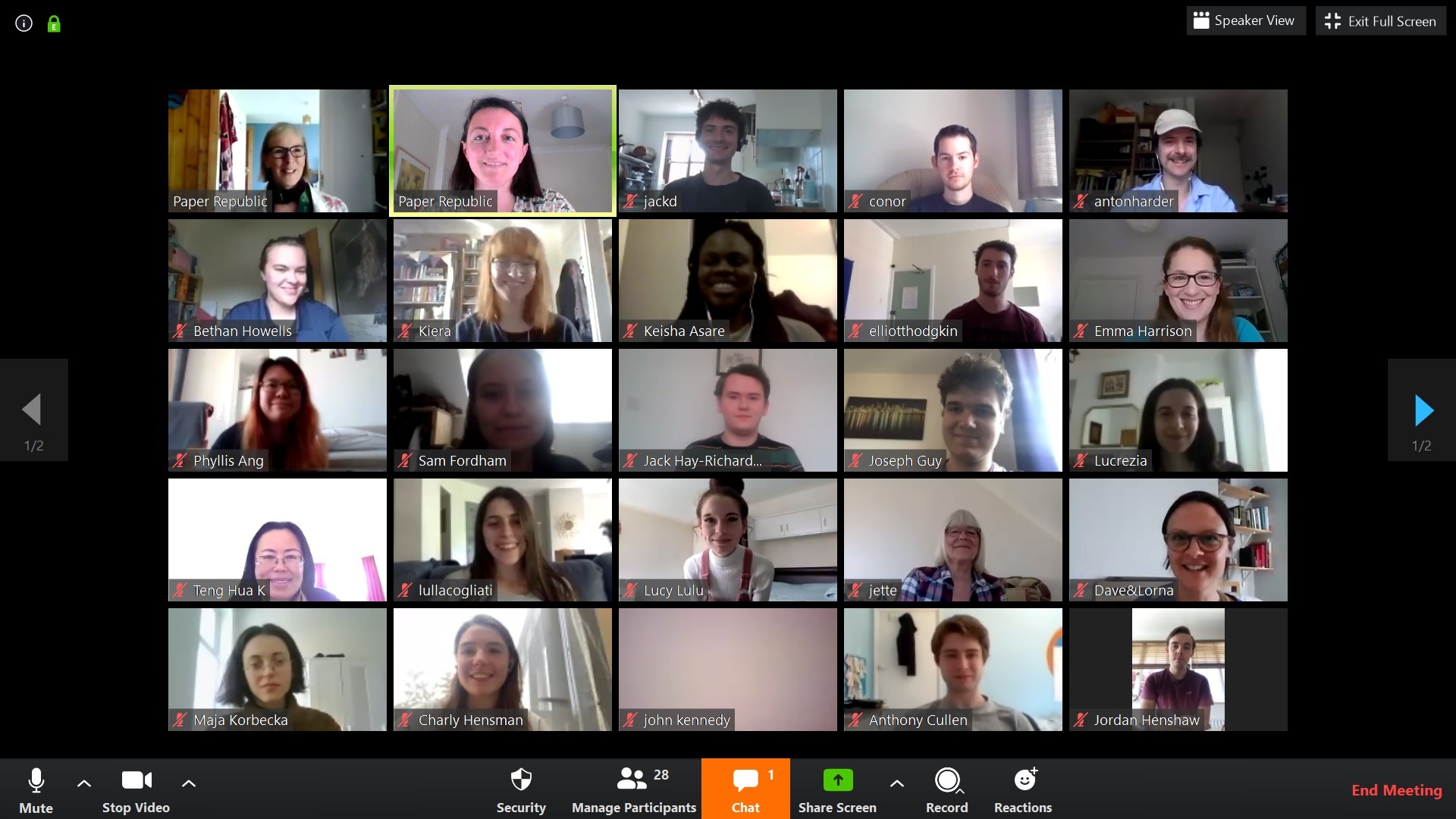
................................




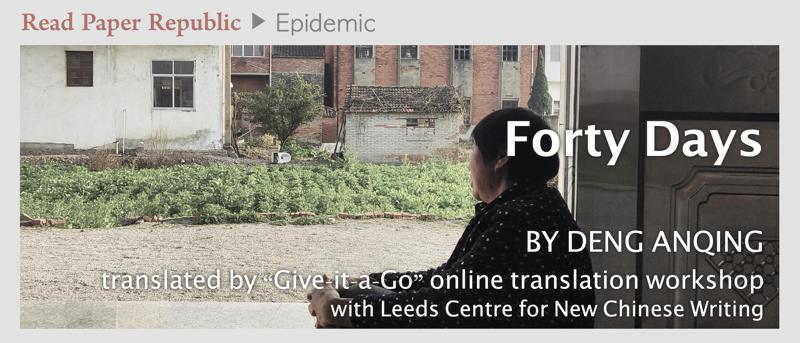
Comments
Wow!;)
Lirong, May 21, 2020, 1:55p.m.
This is so cool.
Angus Stewart, May 30, 2020, 3:29p.m.
amazing
Hachi, July 30, 2020, 10:45a.m.